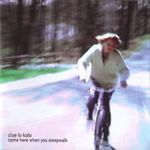|
|
 |
Dusted Reviews
Artist: Clue To Kalo Album: Come Here When You Sleepwalk Label: Mush Review date: Apr. 25, 2003 |

|
|
|
 |
Mark Mitchell is a dreamer. Not the sort that aspires to any sort of unachievable greatness or sits around making excuses; no, Mitchell actually dreams…dreams – involuntary nightly wanderings with no prescribed beginnings or ends, devoid of ego, agenda, or incriminating detail. Ineffable remnants of a long night asleep. Unlike most, however, Mitchell has the unique ability of capturing and reviving these dreams posthumously, giving anyone interested a glimpse into what actually happened last night in bed. In that sense, Mark Mitchell isn’t just a dreamer – he’s also a dreamweaver.
On his first release as Clue To Kalo, Come Here When You Sleepwalk, the twentysomething Australian from Adelaide presents a collection of resuscitated reverie that unfolds with idyllic grace. Mitchell’s exuberant laptop-pop creations are comparable to Dntel and the Notwist in their focus on melodic structure, but Clue To Kalo’s work is strikingly more ambiguous; Mitchell carefully resorts to distinguishable vocals when necessary, choosing instead to generate emotion from harmonious layers of loops and occasionally his own sustained voice.
The beauty of Sleepwalk is grounded in nostalgia, partially for lost lovers, but primarily the inherent intangibility of dreams. Like Múm or perhaps Ulrich Schnauss, Mitchell finds solace in the formative sounds of youth, like a music box or a mobile, and is endearingly unstable at times. Instead of riding locked grooves, Mitchell awkwardly reproduces the ephemeral uncertainty of one’s first steps or maybe even a first kiss – faded rubicons destined to our subconscious. By avoiding stationary loops, Mitchell’s melodies grow into sincere songs that constantly develop through a delicate series of addition and subtraction.
Relationships also play a definite role in Mitchell’s dream machine. All of the lyrics on Sleepwalk involve unrequited love, with Mitchell playing the part of pragmatist. Song titles like “Do You Know That Love Can End?” and “This Dies Over Distance” are exemplary of a morning-after cognizance, something either subconsciously remiss or conveniently forgotten on the album’s instrumental pieces. Some of Mitchell’s lyrics can come off as heavy-handed, but nowhere near as nauseating as Ben Gibbard’s teeth-pulling performance on the ghastly Postal Service album. On the album’s three vocal tracks, Mitchell openly languishes in love without whining or quoting the letters section of Seventeen Magazine.
In fact, the album’s greatest accomplishment is rooted in romantic rhetoric: the 11-minute “Still We Felt Bulletproof”, a magnum opus for the hybridized age. Things start slowly enough, with Mitchell questioning devotion over a lonely, wandering keyboard. A simple Casio beat soon kicks in, marking a gloriously hypnotic de-evolution of sorts into preternatural nostalgia. Vibraphones, carousels and harmonized sighs gradually submerge the listener in tripped-out euphoria. When Mitchell reemerges from the swell, he sings with sincerity: “So let’s go back to the days when things were so much easier in every way / You could pick up memories without even trying / Break it off with lovers without even crying / Say I’ll never leave you without even lying / I know enough about myself to know this is true / I’d like to not be able to go on without you.” He repeats the devastating phrase as rhythm and sound intensify, culminating finally in 10 seconds of total sonic symmetry...before the circuits abruptly unwire and a squall of noise ends the dream, as if recognizing the impossibility of perfection in relationships.
The few moments of clarity don’t diminish Sleepwalk’s seductive anesthetic, which may be one of the album’s drawbacks. If you’re feeling sinister, Clue To Kalo isn't going to empathize. The lack of a dialectic plants Come Here When You Sleepwalk firmly in NeverNever Land with no way out and the periodic nightmare, relatively speaking, might have made the album’s sugarplums that much sweeter.
And yet, how sweet they are.
By Otis Hart
|







